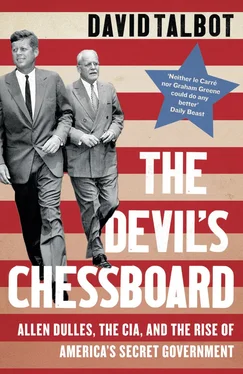A year before, Erica Wallach’s adoptive father, a hopelessly idealistic American Quaker relief worker named Noel Field, had disappeared after being lured to Prague with the promise of a university teaching position. When his equally wide-eyed wife, Herta, and younger brother, Hermann, went looking for Noel behind the Iron Curtain, they, too, vanished. Despite the obvious risk, Wallach was now determined to find out what had happened to the Fields, a family that had rescued her during the war when she was a seventeen-year-old refugee from Nazi Germany and Franco’s Spain. Noel and Herta Field had whisked a sick and starving Erica and her ailing mother from a squalid French refugee camp, and later agreed to care for the teenage girl in Switzerland during the war when her parents fled to England. Wallach now felt honor-bound to track down the missing Fields, using her connections with German Communists whom she had met during the war.
When Wallach asked to see her old war comrades at the SED headquarters, she was told they were not available. She would later find out why: they were in prison, and Erica Wallach would soon join them. On her way out of the gloomy SED fortress, a hand suddenly gripped her shoulder. “Criminal police. Please come around the corner.” She didn’t even bother to turn around. “I knew that all was lost.”
For the next five years, Wallach would suffer harsh imprisonment, first in Berlin’s Schumannstrasse Prison, which she christened her “ house of horrors,” and then, for the longest stretch, in Vorkuta, the dread prison labor complex in Russia’s Arctic wastelands a thousand miles northeast of Moscow. Wallach, the cultured daughter of a physician, learned to survive the gulag by giving up all hope that she would ever return to her family and the lost joys and comforts of her old life. She would rise early each morning in the dark with her labor gang and work as hard as she could to avoid freezing in the ferociously cold temperatures, shoveling gravel six days a week—and often seven—for new railroad embankments.
“ This business of nothing to look at, the ugliness, the lack of color, the lack of good smell—that really is worse than the hunger,” Wallach later recalled. “But you get used to it. I finally after three years got used to the fact that I was totally alone in this world.”
Wallach learned to ingratiate herself with her fellow prisoners—Russian, Ukrainian, German, and Polish women, and even one American who had found small and less small ways of offending the Soviet state. She became a different person than the naïve woman who had walked through Brandenburg Gate that morning in August 1950. She even looked like someone else—muscled and thick and callused from her labors. The young woman made a grim new life for herself there “at the end of the earth” among the drunken, homesick Soviet guards and her fellow penal colony inmates. She found ways to break up the barren monotony of her days by listening to the Ukrainians’ melancholy folk songs and attending the Sunday “salons” hosted by the educated women whose latrine-cleaning duties were the foulest of all prison jobs, but gave them enough leisure to indulge their intellectual curiosity.
In the end, the hardened Wallach decided that surviving a frozen hell like Vorkuta was a matter of mental adjustment. “ Horror, fear, mental torture,” she would later write, “are not physical facts but creations of one’s own spirit. They were not forced upon me by outside acts or conditions, but lived within me, born of the weakness of my own heart … I did not have to break if I did not want to.”
While Wallach was enduring Vorkuta, the Fields were suffering their own nightmares behind the Iron Curtain. After Noel Field was arrested by Czech authorities in May 1949, he was drugged and driven to a secret location in Hungary. There he was dropped down a coal chute and subjected to a variety of tortures, including beatings, sleep deprivation, and round-the-clock interrogations.
Noel’s brother Hermann Field, who was an architecture professor, suffered less vicious treatment after he was grabbed by Polish secret police three months later in Warsaw while searching for his brother. But he spent the first several months of his five-year incarceration in solitary confinement, which wore terribly on his spirit. When a field mouse suddenly appeared in his cell, Hermann was beside himself with joy. The mere brush of the mouse’s fur against Hermann’s leg was the source of enormous comfort. One night, while sleeping, he accidentally crushed the mouse, which had crawled under his mattress. Hermann was so grief-stricken that he feared he would lose his mind. “ A person living a normal lifesimply cannot comprehend how sharply such apparently trivial happenings affect a human being deprived of all living contact and driven to the very edge of loneliness,” he later observed.
During the harsh interrogations to which all four members of the Field family were subjected, including Erica Wallach, one name kept coming up. “How do you know Allen Dulles?” the inquisitors repeatedly asked. The spymaster was the one thread that seemed to connect all four of the deeply unfortunate prisoners as they languished in their cells.
By the time Noel Field was taken prisoner in Czechoslovakia in 1949, it had been nearly four years since Allen Dulles occupied an official position with U.S. intelligence. After the war, Dulles had returned to the fold at Sullivan and Cromwell, a business routine he now found quite dreary. “ I must admit that these days I find it hard to concentrateon my profession of the law,” Dulles confessed to a friend. “Most of my time is spent reliving those exciting days when the war was slowly dying.”
A steady stream of former OSS colleagues came to pay their respects at Dulles’s Wall Street office, chatting about the war while “the Old Man,” as he was already affectionately known in spy circles, though he was only fifty-two, puffed genially on his pipe. But these conversations were not simply fond exercises in nostalgia. The men who called on Dulles—OSS veterans like Richard Helms, Frank Wisner, Tracy Barnes, and Kermit “Kim” Roosevelt—all shared the Old Man’s view that the blissful reign of postwar peace would be short-lived and that the West must quickly gird itself to confront the growing threat from the East.
That threat was not simply a convenient creation of “Western imperialism.” Stalin’s military machine might have been no match for America’s global reach and nuclear firepower. But it was quite capable of crushing democratic aspirations in Eastern Europe, which the Soviets, following the devastation of World War II, felt they were entitled to controlling as a buffer zone from Western aggression. American intelligence officials like Frank Wisner, who had been stationed in Romania near the end of the war and had witnessed the beginnings of the Soviet-dominated police state there, deeply empathized with the liberation struggles of the peoples in the Eastern bloc.
As they chatted in Dulles’s law suite and gathered for drinks at William Donovan’s town house on Sutton Place, this rarefied group of OSS veterans—who straddled the worlds of espionage, foreign affairs, and finance—were already plotting to create a powerful intelligence apparatus for the coming Cold War. Spurned by Harry Truman, Donovan began to feel that his own hopes for a return to postwar action would never be realized. “ Our war is over, Allen,” he told Dulles one day. But Dulles would have none of it. The man’s irrepressible ego and ambition never ceased to amaze Donovan.
In truth, while Dulles punctually showed up for work at Sullivan and Cromwell each morning, he never retired from the intelligence game. No sooner had he resumed his life in New York than he began taking a leadership role in prestigious organizations and placing himself at the center of postwar political debates. At the end of 1945, Dulles was elected president of the Council on Foreign Relations, a group whose membership of prominent businessmen and policy makers played a key role in shaping the emerging Cold War consensus. Dulles would huddle with his colleagues in a soundproof room at the council’s headquarters on the Upper East Side as if he were already running the robust new spy agency that he envisioned.
Читать дальше











